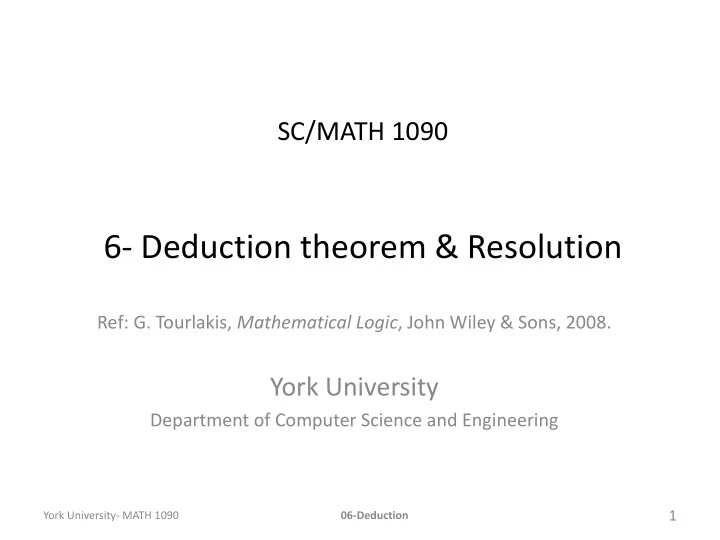

SC/MATH 1090 6- Deduction theorem & Resolution Ref: G. Tourlakis, Mathematical Logic , John Wiley & Sons, 2008. York University Department of Computer Science and Engineering 1 York University- MATH 1090 06-Deduction
Overview • Deduction Theorem – Proving a Lemma (by induction) to prove deduction theorem (by induction on the length of proof!) – Why is deduction theorem important? • Resolution- Easy life!!! – Definitions – Procedure for resolution – Examples York University- MATH 1090 06-Deduction 2
The Deduction Theorem • Lemma . A (B C) ⊢ A (D[ p :=B] D[ p :=C]) • Metatheorem. (Deduction Theorem) If {A} ⊢ B, then also ⊢ A B. • Corollary . +A ⊢ B iff ⊢ A B. • Why is it so important? – Theory: All theorems are equivalent to absolute theorems. – Logic users: when proving ⊢ A B, instead prove +A ⊢ B (which is usually easier) York University- MATH 1090 06-Deduction 3
Equivalent statements • Metatheorem . The following are equivalent: 1) ⊢ 2) For all A, ⊢ A 3) For some B, we have ⊢ B B is called inconsistent if any of above is proven for . • Corollary. (Proof by Contradiction) ⊢ A iff + A ⊢ . – Logic users: when proving ⊢ A , instead prove + A ⊢ (prove inconsistency if A is assumed) York University- MATH 1090 06-Deduction 4
Definitions • Definition. (Literal) Atomic formulae and their negation, also formula variables, and their negation are literals . • Examples of literals: p, p, , A, B • Definition. (Clause) A clause is a disjunction of literals. • Examples of clauses: p p , A B York University- MATH 1090 06-Deduction 5
Resolution (1) 1) Using Deduction and proof by contradiction to move everything to the assumption side, and have on the conclusion side If +A ⊢ B then ⊢ A B. Deduction Theorem If + A ⊢ then ⊢ A. Proof by contradiction In other words, instead of proving ⊢ A B, it is sufficient to prove + {A , B} ⊢ . 2) Remove any using Ping-pong A B (A B) (B A) Ping-pong theorem York University- MATH 1090 06-Deduction 6
Resolution (2) 3) Remove any using implication theorem A B A B Implication theorem 4) Move negation inwards using de Morgan (A B) A B de Morgan 1 (A B) A B de Morgan 2 5) Distribute over A (B C) (A B) (A C) Distributivity of over York University- MATH 1090 06-Deduction 7
Resolution (3) Split 6) A B ⊢ A and A B ⊢ B Split 7) Use Cut Rule to prove A B, A C ⊢ B C Cut Rule A, A ⊢ York University- MATH 1090 06-Deduction 8
Recommend
More recommend